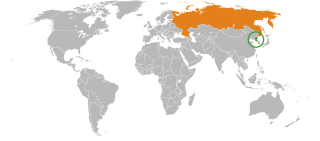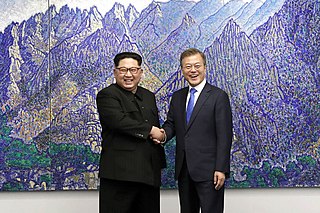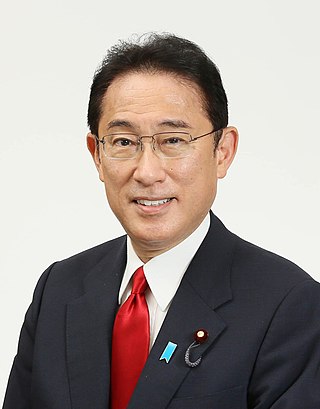Geneva Conference may refer to:

The Group of Seven (G7) is an intergovernmental political forum consisting of Canada, France, Germany, Italy, Japan, the United Kingdom and the United States; additionally, the European Union (EU) is a "non-enumerated member". It is organized around shared values of pluralism, liberal democracy, and representative government. As of 2020, G7 members are large IMF advanced economies and account for over half of global net wealth, 30 to 43 percent of global gross domestic product, and 10 percent of the world's population. Its members maintain mutually close political, economic, diplomatic, and military relations in global affairs.

Kim Jong Un is a North Korean politician who has been supreme leader of North Korea since 2011 and the leader of the Workers' Party of Korea (WPK) since 2012. He is the third son of Kim Jong Il, who was North Korea's second supreme leader from 1994 to 2011, and Ko Yong-hui. He is a grandson of Kim Il Sung, who was the founder and first supreme leader of North Korea from its establishment in 1948 until his death in 1994.

North Korea–Russia relations are the bilateral relations between Russia and North Korea. The Soviet Union was the first to recognize North Korea on October 12, 1948, shortly after the proclamation, as the sole legitimate authority in all of Korea. During the Korean War, the Korean People's Army was supported by the Soviet Armed Forces. North Korea was founded as part of the Communist bloc, and received major Soviet military and political support. The comprehensive personality cult around North Korea's ruling family was heavily influenced by Stalinism. China and the Soviet Union competed for influence in North Korea during the Sino-Soviet split in the 1960s, as North Korea tried to maintain good relations with both countries.

Inter-Korean summits are meetings between the leaders of North and South Korea. To date, there have been five such meetings so far, three of them being in Pyongyang, with another two in Panmunjom. The importance of these summits lies in the lack of formal communication between North and South Korea, which makes discussing political and economic issues difficult. The summits' agendas have included topics such as the ending of the 1950-53 war, the massive deployment of troops at the DMZ, the development of nuclear weapons by North Korea, and human rights issues.

Fumio Kishida is a Japanese politician serving as prime minister of Japan and president of the Liberal Democratic Party (LDP) since 2021. A member of the House of Representatives, he previously served as Minister for Foreign Affairs from 2012 to 2017 and as acting Minister of Defense in 2017. From 2017 to 2020, he also chaired the LDP Policy Research Council.
Since the establishment of North Korea, all three of its leaders—Kim Il Sung, Kim Jong Il and Kim Jong Un—have been known to use high-security private trains as their preferred method of domestic and international travel.

The 2007 Inter-Korean summit meeting was held between October 2 and October 4, 2007, in Pyongyang, between President Roh Moo-hyun of the Republic of Korea and Kim Jong Il of the Democratic People's Republic of Korea (DPRK). It is the second Inter-Korean summit following the 2000 inter-Korean summit. It is also called the 10.4 Inter-Korean summit. As a result of the talks, both sides announced a declaration for the development of inter-Korean relations and peace and prosperity.

The 2018 North Korea–United States Singapore Summit, commonly known as the Singapore Summit, was a summit meeting between North Korean Chairman Kim Jong Un and U.S. President Donald Trump, held at the Capella Hotel, Sentosa, Singapore, on June 12, 2018. It was the first-ever meeting between leaders of North Korea and the United States. They signed a joint statement, agreeing to security guarantees for North Korea, new peaceful relations, the denuclearization of the Korean Peninsula, recovery of soldiers' remains, and follow-up negotiations between high-level officials. Both leaders also met separately with Singaporean Prime Minister Lee Hsien Loong.
North Korea–United States summit may refer to:

The Kim–Xi meetings were a series of summits between North Korea and China during 2018 and 2019. North Korean supreme leader Kim Jong Un secretly met with Chinese paramount leader Xi Jinping on March 25–28, 2018. Xi made a classified invitation to Kim to visit China, after which Kim visited Beijing and used his bullet proof train to travel to the three-day meeting. It is his first known out-of-country diplomatic trip since taking power. Kim and Xi had a second surprise meeting on May 7–8, 2018 in the city of Dalian. Kim and Xi had a third surprise meeting on June 19–20, 2018. They had a fourth surprise meeting on January 7–10, 2019 in Beijing, followed by a fifth official DPRK and China summit June 20–21, 2019 in the Forbidden City, Pyongyang.

The leaders of some countries or their representatives or spokespersons released public statements about the 2018 North Korea–United States summit. The summit received a mixed international reaction, with many countries expressing praise or hope for achieving a peace deal from the summit.

The Peace Treaty on Korean Peninsula is a proposed settlement to formally end military hostilities on the Korean Peninsula as a follow-up to the 1953 Korean Armistice Agreement implemented by the United Nations after the Korean War. During the inter-Korean summit on April 27, 2018, Kim Jong-un and Moon Jae-in signed the Panmunjom Declaration; the declaration involved an agreement about mutual efforts and action items for transforming the armistice agreement into a peace treaty with the cooperation of the United States and China. During the 2018 Trump–Kim summit, US president Donald Trump and Kim signed a Joint Statement which reaffirmed the Panmunjom Declaration.
The September 2018 inter-Korean summit was the third and final inter-Korean summit in the 2018-19 Korean peace process.

The 2019 North Korea–United States Hanoi Summit, commonly known as the Hanoi Summit, was a two-day summit meeting between North Korean supreme leader Kim Jong Un and U.S. president Donald Trump, held at the French Colonial Hôtel Métropole in Hanoi, Vietnam, during February 27–28, 2019. It was the second meeting between the leaders of North Korea and the United States following their first meeting in Singapore the year prior.
The 2018−19 Korean peace process was initiated to resolve the long-running Korean conflict and denuclearize Korea. International concerns about North Korea's nuclear weapons came to a head in 2017, when they posed a direct threat to the United States. At the same time, Moon Jae-in was elected president of South Korea with the promise of returning to the Sunshine Policy, favoring good relations with North Korea. A series of summits were held between North Korea's Kim Jong Un, South Korea's Moon, and Donald Trump of the United States. Trump became the first sitting US President to meet a North Korean leader and to enter North Korean territory. Kim became the first North Korean leader to enter South Korean territory. Moon became the first South Korean President to give a speech in North Korea. In parallel to this, a number of cultural exchanges began. Tensions were lowered on both sides of the DMZ.

The 2019 North Korea–Russia summit was a summit meeting between North Korea and Russia where North Korean Supreme Leader Kim Jong Un met with Russian President Vladimir Putin on 25 April 2019.

The 2019 Koreas–United States DMZ Summit was a one-day summit held at the Korean Demilitarized Zone between North Korean chairman Kim Jong Un, U.S. president Donald Trump, and South Korean president Moon Jae-in, following the 2019 G20 Osaka summit. Trump briefly stepped over the border at 3:45 PM (GMT+9) on June 30, marking the first time a sitting U.S. president had set foot on North Korean soil. It was also the second time since the end of the Korean War in 1953 that a North Korean leader entered the South's territory, following the April 2018 inter-Korean summit. Senior White House advisors Ivanka Trump and Jared Kushner also attended the summit, with Ivanka Trump and U.S. envoy to South Korea Harry B. Harris Jr. holding a meeting with Kim later broadcast on North Korean TV.
North Korea–Russia summit may refer to: